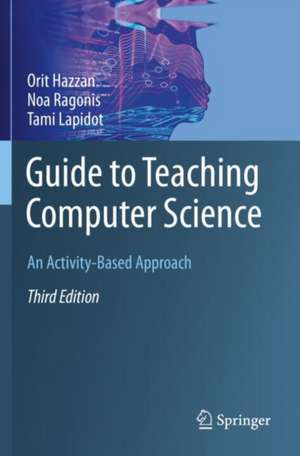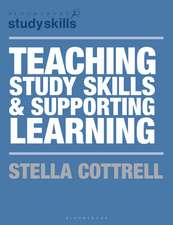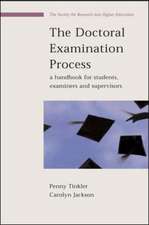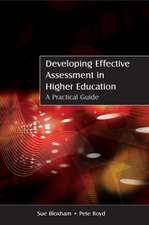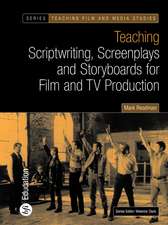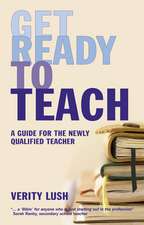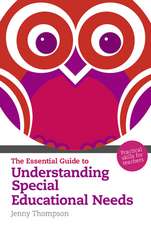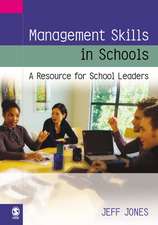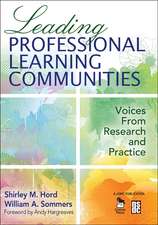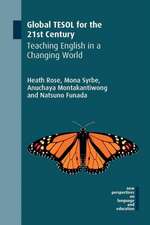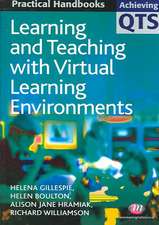Guide to Teaching Computer Science: An Activity-Based Approach
Autor Orit Hazzan, Noa Ragonis, Tami Lapidoten Limba Engleză Paperback – 7 aug 2021
Fully updated and revised, the third edition features more than 40 new activities, bringing the total to more than 150, together with new chapters on computational thinking, data science, and soft concepts and soft skills. This edition also introduces new conceptual frameworks for teaching such as the MERge model, and new formats for the professional development of computer science educators.
Topics and features:includes an extensive set of activities, to further support the pedagogical principles outlined in each chapter; discusses educational approaches to computational thinking, how to address soft concepts and skills in a MTCS course, and the pedagogy of data science (NEW); focuses on teaching methods, lab-based teaching, and research in computer science education, as well as on problem-solving strategies; examines how to recognize and address learners’ misconceptions, and the different types of questions teachers can use to vary their teaching methods; provides coverage of assessment, teaching planning, and designing a MTCS course; reviews high school teacher preparation programs, and how prospective teachers can gain experience in teaching computer science.
This easy-to-follow textbook and teaching guide will prove invaluable to computer science educators within all frameworks, including university instructors and high school teachers, as well asto instructors of computer science teacher preparation programs.
| Toate formatele și edițiile | Preț | Express |
|---|---|---|
| Paperback (3) | 363.43 lei 38-45 zile | |
| SPRINGER LONDON – 14 oct 2016 | 363.43 lei 38-45 zile | |
| Springer International Publishing – 7 aug 2021 | 416.73 lei 38-45 zile | |
| SPRINGER LONDON – 2 sep 2014 | 526.92 lei 6-8 săpt. | |
| Hardback (1) | 430.21 lei 3-5 săpt. | +32.47 lei 7-13 zile |
| Springer International Publishing – 6 aug 2020 | 430.21 lei 3-5 săpt. | +32.47 lei 7-13 zile |
Preț: 416.73 lei
Nou
Puncte Express: 625
Preț estimativ în valută:
79.74€ • 83.26$ • 65.100£
79.74€ • 83.26$ • 65.100£
Carte tipărită la comandă
Livrare economică 31 martie-07 aprilie
Preluare comenzi: 021 569.72.76
Specificații
ISBN-13: 9783030393625
ISBN-10: 3030393623
Pagini: 407
Ilustrații: XX, 407 p. 40 illus., 13 illus. in color.
Dimensiuni: 155 x 235 x 29 mm
Greutate: 0.73 kg
Ediția:3rd ed. 2020
Editura: Springer International Publishing
Colecția Springer
Locul publicării:Cham, Switzerland
ISBN-10: 3030393623
Pagini: 407
Ilustrații: XX, 407 p. 40 illus., 13 illus. in color.
Dimensiuni: 155 x 235 x 29 mm
Greutate: 0.73 kg
Ediția:3rd ed. 2020
Editura: Springer International Publishing
Colecția Springer
Locul publicării:Cham, Switzerland
Cuprins
Introduction—What Is this Guide About?.- Active Learning and the Active-Learning-Based Teaching Model.- Overview of the Discipline of Computer Science.- Computational Thinking.- Computer Science Soft Concepts and Soft Skills.- Data Science and Computer Science Education.- Research in Computer Science Education.- Problem-Solving Strategies.- Learners’ Alternative Conceptions.- Teaching Methods in Computer Science Education.- Lab-Based Teaching.- Types of Questions in Computer Science Education.- Assessment.- Teaching Planning.- Design of Methods of Teaching Computer Science Courses.- Getting Experience in Computer Science Education.- High School Computer Science Teacher Preparation Programs.- Epilogue.
Notă biografică
Dr. Orit Hazzan is Professor at the Department of Education in Science and Technology at Technion – Israel Institute of Technology. Her other publications include the Springer titles Application of Management Theories for STEM Education, Risk Management of Education Systems, The MERge Model for Business Development, Agile Anywhere, and Agile Software Engineering.
Dr. Noa Ragonis is a researcher in the field of computer science education, focusing on cognitive aspects of teaching and learning, particularly in relation to logic programming, object oriented programming, and computational thinking. She has authored ten computer science high-school textbooks and teachers' guides.
Dr. Tami Lapidot is Executive Manager of Machshava – the Israeli National Center for Computer Science Teachers.
All three authors have extensive experience of teaching, management, research, and involvement in computer science teacher preparation programs, as well as of participation in national initiatives and policy-making committees. They have taught courses on computer science and on computer science education to high school pupils, undergraduate students, and pre-service and in-service teachers. The research the authors have conducted examines a variety of computer science education topics, including teaching methods, learning processes, teacher preparation, and social and organizational issues of computer science education.
Dr. Noa Ragonis is a researcher in the field of computer science education, focusing on cognitive aspects of teaching and learning, particularly in relation to logic programming, object oriented programming, and computational thinking. She has authored ten computer science high-school textbooks and teachers' guides.
Dr. Tami Lapidot is Executive Manager of Machshava – the Israeli National Center for Computer Science Teachers.
All three authors have extensive experience of teaching, management, research, and involvement in computer science teacher preparation programs, as well as of participation in national initiatives and policy-making committees. They have taught courses on computer science and on computer science education to high school pupils, undergraduate students, and pre-service and in-service teachers. The research the authors have conducted examines a variety of computer science education topics, including teaching methods, learning processes, teacher preparation, and social and organizational issues of computer science education.
Textul de pe ultima copertă
This concise yet thorough textbook presents an active-learning model for the teaching of computer science. Offering both a conceptual framework and detailed implementation guidelines, the work is designed to support a Methods of Teaching Computer Science (MTCS) course, but may be applied to the teaching of any area of computer science at any level, from elementary school to university. This text is not limited to any specific curriculum or programming language, but instead suggests various options for lesson and syllabus organization.
Fully updated and revised, the third edition features more than 40 new activities, bringing the total to more than 150, together with new chapters on computational thinking, data science, and soft concepts and soft skills. This edition also introduces new conceptual frameworks for teaching such as the MERge model, and new formats for the professional development of computer science educators.
Topics and features:
Dr. Orit Hazzan is Professor at the Department of Education in Science and Technology at Technion – Israel Institute of Technology. Dr. Noa Ragonis is Head of the M.Teach. program for Secondary Education and the M.Ed. program in Integrative STEM Education at Beit Berl College, Israel. She is a computer science senior lecturer, and an adjunct senior lecturer at the Department of Education in Science and Technology, Technion. Dr. Tami Lapidot is Executive Manager of Machshava – the Israeli National Center for Computer Science Teachers.
Fully updated and revised, the third edition features more than 40 new activities, bringing the total to more than 150, together with new chapters on computational thinking, data science, and soft concepts and soft skills. This edition also introduces new conceptual frameworks for teaching such as the MERge model, and new formats for the professional development of computer science educators.
Topics and features:
- Includes an extensive set of activities, to further support the pedagogical principles outlined in each chapter
- Discusses educational approaches to computational thinking, how to address soft concepts and skills in a MTCS course, and the pedagogy of data science (NEW)
- Focuses on teaching methods, lab-based teaching, and research in computer science education, as well as on problem-solving strategies
- Examines how to recognize and address learners’ misconceptions, and the different types of questions teachers can use to vary their teaching methods
- Provides coverage of assessment, teaching planning, and designing a MTCS course
- Reviews high school teacher preparation programs, and how prospective teachers can gain experience in teaching computer science
Dr. Orit Hazzan is Professor at the Department of Education in Science and Technology at Technion – Israel Institute of Technology. Dr. Noa Ragonis is Head of the M.Teach. program for Secondary Education and the M.Ed. program in Integrative STEM Education at Beit Berl College, Israel. She is a computer science senior lecturer, and an adjunct senior lecturer at the Department of Education in Science and Technology, Technion. Dr. Tami Lapidot is Executive Manager of Machshava – the Israeli National Center for Computer Science Teachers.
Caracteristici
Presents both a conceptual framework and detailed implementation guidelines for general computer science teaching Clearly written and structured to be applicable to all levels of education and for any teaching organization, without limiting its focus to instruction for any specific curriculum, programming language or paradigm Provides learning activities throughout the book Fully updated new edition featuring new chapters on computational thinking, soft ideas, and data science
Recenzii
“This book represents a comprehensive collection of information that is suitable for all teachers and lecturers who deliver computer programming language courses. … This is an excellent book for computer science educators, with a wealth of information that should be used by all teaching practitioners. … I would recommend this book to all computer science educators and suggest it become mandatory reading for novice computer science teachers entering the classroom.” (S. M. Godwin, Computing Reviews, June, 2015)
